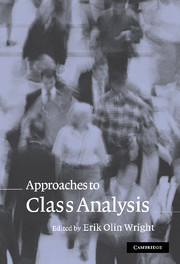Book contents
- Frontmatter
- Contents
- List of figures
- List of tables
- List of contributors
- Introduction
- 1 Foundations of a neo-Marxist class analysis
- 2 Foundations of a neo-Weberian class analysis
- 3 Foundations of a neo-Durkheimian class analysis
- 4 Foundations of Pierre Bourdieu's class analysis
- 5 Foundations of a rent-based class analysis
- 6 Foundations of a post-class analysis
- Conclusion: If “class” is the answer, what is the question?
- References
- Index
Introduction
Published online by Cambridge University Press: 22 September 2009
- Frontmatter
- Contents
- List of figures
- List of tables
- List of contributors
- Introduction
- 1 Foundations of a neo-Marxist class analysis
- 2 Foundations of a neo-Weberian class analysis
- 3 Foundations of a neo-Durkheimian class analysis
- 4 Foundations of Pierre Bourdieu's class analysis
- 5 Foundations of a rent-based class analysis
- 6 Foundations of a post-class analysis
- Conclusion: If “class” is the answer, what is the question?
- References
- Index
Summary
In March 2001, on the BBC Radio 4 Today program, a report was presented discussing a new seven-category class scheme being used in the British Census. Listeners were invited to the BBC website to see what class they were in. Within a few days there were over 50,000 hits on the site, a record for this sort of thing. At least for the segment of the British population that listens to the BBC morning news, class remains a salient issue.
In the broadcast a number of people were interviewed. One police inspector responded to being told that he was now classified in class I along with doctors, lawyers, and chief executives of corporations, by saying, “Does it mean now I have to wear tennis whites when I go out to do my gardening? … I don't see myself socially or economically in the same class as them.” In a subsequent “live chat” program with Professor David Rose of Essex University, the principal designer of the new Census categories, many people called up complaining about the coding scheme. A truck driver objected to being in class VII on the grounds that his job was quite skilled and he had to use new information technologies and computers in his work. David Rose explained that the classification was meant to capture differences in the nature of the employment contract and conditions of work, not the skill level of jobs, and truck drivers typically had quite insecure conditions of employment.
- Type
- Chapter
- Information
- Approaches to Class Analysis , pp. 1 - 3Publisher: Cambridge University PressPrint publication year: 2005
- 1
- Cited by



